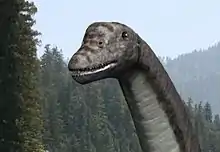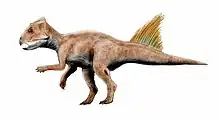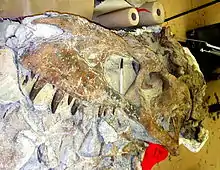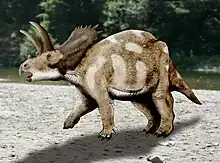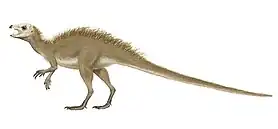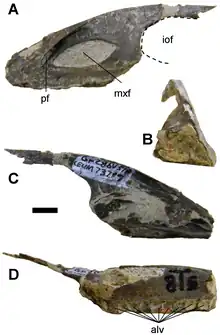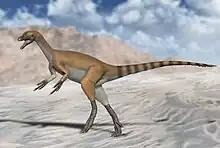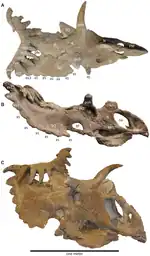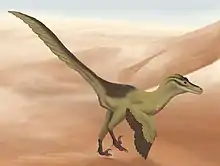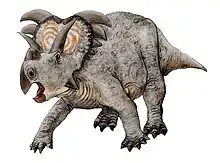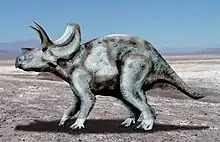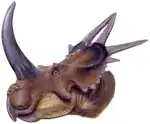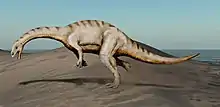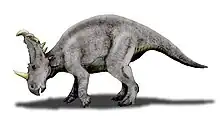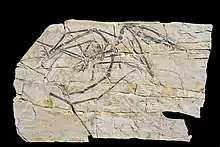2010 in archosaur paleontology
The year 2010 in Archosaur paleontology was eventful. Archosaurs include the only living dinosaur group — birds — and the reptile crocodilians, plus all extinct dinosaurs, extinct crocodilian relatives, and pterosaurs. Archosaur palaeontology is the scientific study of those animals, especially as they existed before the Holocene Epoch began about 11,700 years ago. The year 2010 in paleontology included various significant developments regarding archosaurs.
| |||
|---|---|---|---|
| |||
This article records new taxa of fossil archosaurs of every kind that have been described during the year 2010, as well as other significant discoveries and events related to paleontology of archosaurs that occurred in the year 2010.
Newly named crurotarsans
| Name | Status | Authors | Age | Unit | Location | Notes | Images |
|---|---|---|---|---|---|---|---|
|
Valid |
|
Turonian/Santonian |
| ||||
|
Valid |
|
A horned crocodile that preyed on early hominids |
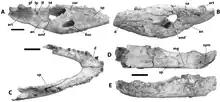 Mandibular remains of Crocodylus anthropophagus 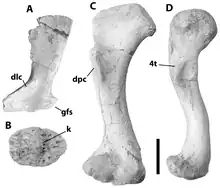 Postcranial remains of Crocodylus anthropophagus | ||||
|
Valid |
|
Paleocene |
A short-snouted dyrosaurid which had a generalist feeding strategy. It grew to lengths of about 7 feet. |
||||
|
Valid |
|
Late Eocene |
 Mandibular remains of Diplocynodon 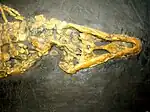 Remains of Diplocynodon. | ||||
|
Valid |
|
Bathonian |
A new genus for "Teleidosaurus" gaudryi (Collot, 1905). "Metriorhynchus" bathonicus (Mercier, 1933) is a second species of Eoneustes. |
||||
|
Valid |
|
Callovian/Kimmeridgian |
A new genus for "Metriorhynchus" leedsi (Andrews, 1913). "Metriorhynchus" acutus (Lennier, 1887) is a second species of Gracilineustes. |
||||
|
Valid |
|
Late Eocene |
An early alligatorine. | ||||
|
Valid |
|
Albian |
|||||
|
Valid |
|
Norian |
A phytosaur. |
||||
|
Valid |
|
Late Carnian |
Krasiejów deposits |
||||
|
Valid |
|
Maastrichtian |
Originally described as a species of Theriosuchus; Tennant, Mannion & Upchurch (2016) transferred it to the genus Sabresuchus.[11] |
||||
|
Valid |
|
Kimmeridgian |
A new genus for "Dakosaurus" carpenteri (Wilkinson et al., 2008) |
||||
|
Valid |
|
Eocene (Wasatchian) |
An early caiman. |
Newly named basal dinosauriforms
| Name | Status | Authors | Age | Unit | Location | Notes | Images |
|---|---|---|---|---|---|---|---|
|
Valid |
Anisian |
A silesaurid, and the oldest known ornithodire. |
| ||||
Newly named non-avian dinosaurs
- A new family of allosauroid theropods, Neovenatoridae, is published by Benson, Carrano, and Brusatte.[15]
- A new family of tyrannosauroid theropods, Proceratosauridae is published by Rauhut, Milner and Moore-Fay.[16]
62 new genera and additional 2 new species have been described in 2010.
| Name | Status | Authors | Discovery year | Age | Unit | Location | Notes | Images |
|---|---|---|---|---|---|---|---|---|
|
Valid |
|
Hettangian |
A facultively quadrupedal prosauropod which displays transitional characters connecting more primitive obligate bipedal forms with the more derived obligative quadrupedal sauropodomorphs. |
| ||||
|
Valid |
|
Albian |
A narrow toothed brachiosaurid whose remains include the first known cranial material of any Cretaceous sauropod from the Americas. |
| ||||
|
Valid |
|
Santonian |
A coronosaurian ceratopsian. |
|||||
|
Valid |
|
?Aptian–Albian |
A second species of Archaeoceratops. |
| ||||
|
Nomen Dubium |
|
Maastrichtian |
A Somphospondylan Sauropod known only from a single weakly heterocoelous tail vertebrae. Heterocoelous vertebrae are those where the centrum or body of a vertebra has saddle-shaped surface where it meets the vertebrae both in front and behind it. |
|||||
|
Valid |
|
Late Cretaceous |
A titanosaur |
|||||
|
Valid |
|
2002[23] |
Maastrichtian |
A basal abelisauroid |
||||
|
Valid |
|
Maastrichtian |
An oviraptorid known from a skull with a striated crest. |
|||||
|
Valid |
|
Early Valanginian |
A new genus for "Iguanodon" dawsoni (Lydekker, 1888). |
|||||
|
Valid |
|
Aptian-Albian |
A giant ornithomimosaur. |
| ||||
|
Valid |
|
Campanian |
A 30-foot tyrannosauroid known from the remains of both adults and juveniles. Previously considered a species of Daspletosaurus. |
| ||||
|
Valid |
|
Late Maastrichtian |
A lambeosaurine hadrosaurid |
|||||
|
Valid |
|
Early Cretaceous |
||||||
|
Valid |
|
Late Triassic |
A guaibasaurid sauropodomorph |
|||||
|
Valid |
|
Early Jurassic |
A prosauropod. |
|||||
|
Valid |
|
Campanian |
A chasmosaurine ceratopsid with the largest horns of any dinosaur currently known.[33] |
|||||
|
Valid |
|
Barremian |
A carcharodontosaurid with a pointed, hump-like crest near the hips and bumps on the ulnae that may be quill knobs. |
| ||||
|
Valid |
|
early 1960s[35] |
Lower Bathonian |
A large basal tetanuran known from scant remains. |
||||
|
Valid |
|
Middle Campanian |
A centrosaurine ceratopsid. |
| ||||
|
Valid |
|
Late Jurassic |
A titanosauriform sauropod |
|||||
|
Valid |
|
late 1970s[38] |
Lower Tithonian |
A heterodontosaurid and the smallest known ornithischian dinosaur. |
| |||
|
Valid |
|
Barremian |
A titanosauriform sauropod. |
|||||
|
Valid |
|
?lower Barremian |
A troodontid. |
| ||||
|
Valid |
|
Campanian |
A basal hadrosauroid |
|||||
|
Valid |
2004[43] |
Oxfordian |
The most primitive known alvarezsauroid. |
| ||||
|
Valid |
|
A basal iguanodontian |
| |||||
|
Valid |
|
Early Valanginian |
A new genus for "Iguanodon" fittoni (Lydekker, 1889). |
|||||
|
Junior synonym of Massospondylus |
|
Hettangian |
Originally interpreted as a distinct basal sauropodomorph, but now appears to be a misidentified juvenile Massospondylus specimen. |
|||||
|
Valid |
|
?lower Barremian |
A basal iguanodontian |
| ||||
|
Valid |
|
Turonian |
Basal hadrosauroid. |
|||||
|
Valid |
|
Sinemurian/Pliensbachian |
A basal tetanuran |
|||||
|
Valid |
|
Bathonian |
A tyrannosauroid |
| ||||
|
Valid |
|
Late Campanian |
A chasmosaurine ceratopsid. |
| ||||
|
Valid |
|
1848 |
Barremian |
A basal iguanodont, formerly classified as Iguanodon anglicus |
ñ | |||
|
Valid |
Campanian |
A dromaeosaurid |
| |||||
|
Valid |
|
Early Cretaceous |
A eusauropod. |
|||||
|
Valid |
|
Late Cretaceous |
An ingeniine oviraptorid. |
|||||
|
Valid |
|
Campanian |
A ceratopsid dinosaur. Initially considered to be a member of Chasmosaurinae, subsequently reinterpreted as a member of Centrosaurinae.[55] |
|||||
|
Valid |
|
Late Campanian |
A long-horned chasmosaurine ceratopsid. |
| ||||
|
Valid |
|
Late Cretaceous |
A chasmosaurine ceratopsid. |
| ||||
|
Valid |
|
Maastrichtian |
A titanosaur |
|||||
|
Valid |
|
Campanian-Maastrichtian |
An aeolosaurini titanosaur |
|||||
|
Valid |
|
Santonian |
A small bird-like paravian estimated to reach slightly more than two feet in length. |
|||||
|
Valid |
|
Late Barremian |
A basal iguanodont |
|||||
|
Valid |
|
Lower Cretaceous |
Bayan Gobi Formation |
A ninth or eleventh species of Psittacosaurus. |
||||
|
Valid |
|
Maastrichtian |
An abelisaurid |
|||||
|
Valid |
|
Campanian |
A new genus for "Styracosaurus" ovatus Gilmore, 1930. |
| ||||
|
Valid |
|
Late Carnian |
||||||
|
Valid |
|
2005[67] |
Pleinsbachian |
A basal sauropodomorph |
||||
|
Valid |
|
Early Valanginian |
A basal iguanodont |
|||||
|
Valid |
Upper Cretaceous |
A basal centrosaurine. |
||||||
|
Valid |
|
Maastrichtian |
A chasmosaurine ceratopsid. |
|||||
|
Valid |
|
Upper Campanian |
A basal pachycephalosaur. |
|||||
|
Valid |
|
Early Cretaceous |
A short-armed dromaeosaurid. |
|||||
|
Valid |
|
Early Jurassic |
Yimen Formation |
A mamenchisaurid sauropod. |
||||
|
Junior synonym |
|
Mid Valanginian |
Junior synonym of Barilium |
|||||
|
Valid |
|
Late Campanian |
A chasmosaurine ceratopsid. |
|||||
|
Valid |
|
Late Campanian |
A chasmosaurine ceratopsid. A new genus for "Chasmosaurus" irvinensis Holmes et al., 2001. |
|||||
|
Junior synonym |
|
Early Valanginian |
Junior synonym of Hypselospinus |
|||||
|
Valid |
|
late Campanian-early Maastrichtian |
Second hadrosauroid from South America. |
|||||
|
Valid |
|
Aptian–Albian |
A longirostrine tyrannosauroid. |
|||||
|
Valid |
Campanian |
A parvicursorine. |
||||||
|
Valid |
Campanian |
A troodontid. |
||||||
|
Valid |
|
Lower Jurassic |
A prosauropod. |
|||||
|
Valid |
Upper Cretaceous |
| ||||||
|
Valid |
|
Oxfordian |
Basal coelurosaur |
|||||
Newly named birds
| Name | Status | Novelty | Authors | Age | Unit | Location | Notes | Images |
|---|---|---|---|---|---|---|---|---|
|
Agapornis atlanticus [80] |
Valid |
Sp. nov. |
Denis Geraads |
Late Pliocene |
A Psittacidae, a lovebird. |
|||
|
Ankonetta larriestrai [81] |
Valid |
Gen. nov. et Sp. nov. |
Marcos M. Cenizo Federico L. Agnolín |
Early or Middle Miocene |
A basal member of Anatidae. This is type species of the new genus. |
|||
|
Valid |
Sp. nov. |
Priscilla Gaff Walter E. Boles |
Middle Miocene |
An Accipitridae, the oldest Aquila species is in Australia. |
||||
|
Valid |
Gen. nov. et Sp. nov. |
Csiki Vremir et al.[CAL 29] |
Late Cretaceous: Maastrichtian |
A four-toed, two-fingered avialian. |
||||
|
Valid |
Gen. nov. et Sp. nov. |
An Enantiornithes Walker, 1981, Avisauridae Brett-Surman & Paul, 1985. This is the type species of the new genus. |
||||||
|
?Borvocarbo tardatus [85] |
Valid |
Sp. nov. |
Ursula B. Göhlich |
Early Miocene |
MN 4c |
A Phalacrocoracoidea, Pelecaniformes, possibly a species of Borvocarbo. |
||
|
Valid |
Gen. nov. et Sp. nov. |
Li Li En-pu Gong Li-dong Zhang Ya-jun Yang Lian-hai Hou |
An Enantiornithes Walker, 1981, Longipterygidae Zhang, Zhou, Hou et Gu, 2000, this is the type species of the new genus. |
|||||
|
Valid |
Sp. nov. |
Carlos Rando Josep A. Alcover Juan C. Illera |
Late Pleistocene to Holocene |
|||||
|
Celericolius acriala [88] |
Valid |
Gen. nov. et Sp. nov. |
|
A Coliidae, a species of Coliidae. This is the type species of the new genus. |
||||
|
Disputed |
Sp. nov. |
Li Li Wang Jing-qi Hou Shi-lin |
A species of Confuciusornis known from a single skeleton. Considered to be a junior synonym of Confuciusornis sanctus by Wang, O'Connor & Zhou (2018).[90] |
|||||
|
Valid |
Sp. nov. |
Jenő Kessler |
Late Pliocene |
MN 15-16 |
A new species of Corvus, Corvidae. |
|||
|
Cuculus pannonicus [91] |
Valid |
Sp. nov. |
Jenö Kessler |
Late Miocene; |
MN 13; MN 16 |
A new species of Cuculus, Cuculidae. |
||
|
Valid |
Gen. nov. |
Larry D. Martin |
Early Eocene |
|
A new genus with Primobucco olsoni Feduccia et Martin, 1976. as the type species. |
|||
|
Dasornis abdoun [93] |
Valid |
Sp. nov. |
Estelle Bourdon |
Early Eoceen |
An Odontopterygiformes. Dasornis Owen, 1870. The type species is Dasornis londinensis Owen, 1870. |
|||
|
Eozygodactylus americanus [94] |
Valid |
Gen. nov. et Sp. nov. |
Ilka Weidig |
|
A Zygodactylidae Brodkorb, 1971, ?Piciformes, this is the type species of the new genus. |
|||
|
Eurystomus beremedensis [95] |
Valid |
Sp. nov. |
Jenö Kessler |
Late Pliocene |
A new species of Eurystomus, Coraciidae. |
|||
|
Valid |
Gen. nov. et Sp. nov. |
Ronald S. Tykoski Anthony R. Fiorillo |
|
An Enantiornithes Walker, 1981. This is the type species of the new genus. |
||||
|
Geronticus olsoni [80] |
Valid |
Sp. nov. |
Denis Geraads |
Late Pliocene |
A Threskiornithidae, a species of Geronticus. |
|||
|
Glaucidium baranensis [95] |
Valid |
Sp. nov. |
Jenö Kessler |
Late Pliocene |
MN 15-16 |
A new species of Glaucidium, Strigidae. |
||
|
Gyps bochenskii [97] |
Valid |
Sp. nov. |
Zlatozar N. Boev |
Late Pliocene |
A new species of Gyps, Accipitridae. |
|||
|
Valid |
Gen. nov. et Sp. nov. |
Alyssa K. Bell Shigeru Suzuki K. Tsogtbaatar |
A predatory ground bird known from an unusual hind limb. This is the type species of the new genus. |
|||||
|
Valid |
Gen. nov. et Sp. nov. |
Wang Xia Zhang Zihui Gao Chunling Hou Lianhan Meng Qingjin Liu Jinyuan |
An Enantiornithes Walker, 1981. This is the type species of the new genus. |
|||||
|
Valid |
Gen. nov. et Sp. nov. |
Rodolfo Salas-Gismondi Ali J. Altamirano Matthew D. Shawkey Liliana D’Alba Jakob Vinther Thomas J. DeVries Patrice Baby |
Late Eocene |
A giant Spheniscidae and the type species of the new genus. |
||||
|
Valid |
Gen. nov. et Sp. nov. |
Emilio Novas Federico L. Agnolín Carlos A. Scanferla |
Las Curtiembres Formation |
An Enantiornithes Walker, 1981, Avisauridae Brett-Surman et Paul, 1985, the type species of the new genus. |
||||
|
Valid |
Gen. nov. et Sp. nov. |
Jacqueline M. T. Nguyen Alan J. D. Tennyson Jennifer P. Worthy R. Paul Scofield Walter E. Boles |
Early Miocene |
A new genus and species of Acanthisittidae, it is the type species of the new genus. |
||||
|
Lamarqueavis australis [103] |
Valid |
Gen. nov. et Sp. nov. |
Federico L. Agnolin |
A Cimolopterygidae Brodkorb, 1963, this is the type species of the new genus. |
||||
|
Lamarqueavis minima [104] |
Valid |
Comb. nov. |
|
A new genus for Cimolopteryx minima Brodkorb, 1963, transferred to Lamarqueavis by Agnolin, 2010.[103] |
||||
|
Lamarqueavis petra [105] |
Valid |
Comb. nov. |
Sylvia Hope |
|
A new genus for Cimolopteryx petra Hope, 2002, transferred to Lamarqueavis by Agnolin, 2010.[103] |
|||
|
Valid |
Sp. nov. |
Hanneke J.M. Meijer Rokus Awe Due |
Late Pleistocene |
A giant marabou stork, Ciconiidae. |
||||
|
Valid |
Gen. nov. et Sp. nov. |
Gao Ke-Qin |
A Hongshanornithidae O’Connor, Gao et Chiappe, 2010, this is the type species of the new genus. |
|||||
|
Lophogallus naranbulakensis [108] |
Valid |
Gen. nov. et Sp. nov. |
Nikita V. Zelenkov |
Middle Miocene |
Naran Bulak Formation |
A Phasianidae, this is the type species of the new genus. |
||
|
Valid |
Gen. nov. et Sp. nov. |
R. Paul Scofield Alan J. D. Tennyson |
An Ardeidae, the type species of the new genus. |
|||||
|
Valid |
Gen. nov. et Sp. nov. |
A small Psittacidae, the type species of the new genus. |
||||||
|
Morsoravis sedilis [111] |
Valid |
Gen. nov. et Sp. nov. |
Sara Bertelli Bent E. K. Lindow |
Early Eocene |
The type species of the new genus. A bird of uncertain phylogenetic placement; it might be a relative of Charadriiformes[111] or a relative of the passerines and the extinct family Zygodactylidae.[112] Maybe close to Pumiliornis tessellatus G. Mayr, 1999.[112][113] |
|||
|
Valid |
Comb. nov. |
Kenneth E. Campbell Jr. Zbigniew M. Bocheński |
Late Pleistocene |
|
Strigidae, a new genus for Strix brea Howard (1933), the type species of the new genus. |
|||
|
Valid |
Sp. nov. |
Alan J. D. Tennyson R. Paul Scofield |
Early Miocene |
A Phoenicopteriformes, Palaelodidae Stejneger, 1885. |
||||
|
Valid |
Sp. nov. |
David Rubilar-Rogers |
A Pelagornithidae Fürbringer, 1888 with a large wingspan. |
| ||||
|
Valid |
Gen. nov. et Sp. nov. |
Middle Eocene |
A member of Neognathae Incertae Sedis. The type species of the new genus. |
|||||
|
Plioperdix africana [80] |
Valid |
Sp. nov. |
Cécille Mourer-Chauviré Denis Geraads |
Late Pliocene |
A Phasianidae, Galliformes, a species of Plioperdix Kretzoi, 1955. |
|||
|
Presbyornis mongoliensis [118] |
Valid |
Sp. nov. |
Evgeney N. Kurochkin |
Late Paleocene |
Bumbam Member of the Narabulag Svita |
A Presbyornithidae Wetmore, 1926, Anseriformes. |
||
|
Rhenanorallus rhenanus [110] |
Valid |
Gen. nov. et Sp. nov. |
MN 2a, Wiesbaden Formation, Mainz Basin |
A small Rallidae, the type species of the new genus. |
||||
|
Valid |
Gen. nov. et Sp. nov. |
Wang Xuri Gao Chunling Cheng Xiaodong |
An Enantiornithes Walker, 1981, this is the type species of the new genus. |
|||||
|
Valid |
Gen. nov. et Sp. nov. |
Hu Dongyu Li Li Hou Lianhai |
A Sapeornithidae Zhou, 2006, this is the type species of the new genus. |
|||||
|
Valid |
Sp. nov. |
Rajendra S. Rana Kenneth D. Rose Ashok Sahni Lachham Singh Thierry Smith |
Early Eocene |
A Vastanavidae G. Mayr, Rana, Rose, Sahni, Kumar, Sing et T. Smith, 2010, basal Psittaciformes. |
||||
|
Valid |
Gen. nov. et Sp. nov. |
Zhang Fucheng Li Zhiheng |
A beaked basal avialan |
Newly named pterosaurs
| Name | Status | Authors | Age | Unit | Location | Notes | Images |
|---|---|---|---|---|---|---|---|
|
Valid |
|
Cenomanian |
An ornithocheirid known only from a partial lower jaw. |
||||
|
Valid |
|
Late Cretaceous |
An azhdarchid known only from five fragments of the front upper and lower jaws, and possibly a neck vertebra. |
| |||
|
Valid |
|
Middle Jurassic |
An istiodactylid[125] or a poorly preserved specimen of Darwinopterus.[126] |
||||
|
Valid |
|
Oxfordian |
A wukongopterid that was described as a derived rhamphorhynchoid with transitional characters connecting it with pterodactyloids. |
| |||
|
Valid |
|
Late Jurassic |
A second species of Darwinopterus |
||||
|
Disputed |
|
Late Coniacian/Early Santonian |
A pteranodontid. The type species is Dawndraco kanzai. Martin-Silverstone et al. (2017) consider this species to be a junior synonym of Pteranodon sternbergi.[130] |
||||
|
Valid |
|
Late Triassic |
|||||
|
Valid |
|
Middle Jurassic |
An earliest scaphognathine pterosaur. |
||||
|
Valid |
|
Late Coniacian - Early Campanian |
A pteranodontid. |
||||
|
Valid |
|
Late Jurassic |
A wukongopterid. The type species is Kunpengopterus sinensis. |
||||
|
Valid |
|
Lower Aptian |
Leza Formation |
||||
|
Valid |
|
Oxfordian |
A rhamphorhynchid with a nearly six foot wingspan. |
||||
|
Valid |
|
Barremian |
A boreopterid. |
||||
Notes
References
- Paulo Miranda Nascimento; Hussam Zaher (2010). "A new species of Baurusuchus (Crocodyliformes, Mesoeucrocodylia) from the Upper Cretaceous of Brazil, with the first complete postcranial skeleton described from the family Baurusuchidae" (PDF). Papéis Avulsos de Zoologia. 50 (21): 323‑361. doi:10.1590/s0031-10492010002100001. Retrieved 14 January 2011.
- Brochu CA, Njau J, Blumenschine RJ, Densmore LD (2010). Lalueza-Fox C (ed.). "A New Horned Crocodile from the Plio-Pleistocene Hominid Sites at Olduvai Gorge, Tanzania". PLoS ONE. 5 (2): e9333. Bibcode:2010PLoSO...5.9333B. doi:10.1371/journal.pone.0009333. PMC 2827537. PMID 20195356.
- Hastings, A. K; Bloch, J. I.; Cadena, E. A.; Jaramillo, C. A. (2010). "A new small short-snouted dyrosaurid (Crocodylomorpha, Mesoeucrocodylia) from the Paleocene of northeastern Columbia". Journal of Vertebrate Paleontology. 30 (1): 139–162. Bibcode:2010JVPal..30..139H. doi:10.1080/02724630903409204. S2CID 84705605.
- Jeremy E. Martin (2010). "A new species of Diplocynodon (Crocodylia, Alligatoroidea) from the Late Eocene of the Massif Central, France, and the evolution of the genus in the climatic context of the Late Palaeogene". Geological Magazine. 147 (4): 596–610. Bibcode:2010GeoM..147..596M. doi:10.1017/S0016756809990161. S2CID 140593139.
- Young, M.T.; Brusatte, S.L.; Ruta, M.; de Andrade, M.B. (2010). "The evolution of Metriorhynchoidea (Mesoeucrocodylia, Thalattosuchia): an integrated approach using geometric morphometrices, analysis of disparity, and biomechanics". Zoological Journal of the Linnean Society. 158 (4): 810–859. doi:10.1111/j.1096-3642.2009.00571.x.
- Jeremy A Martin; K. Lauprasert (2010). "A new primitive alligatorine from the Eocene of Thailand: relevance of Asiatic members to the radiation of the group". Zoological Journal of the Linnean Society. 158 (3): 608–628. doi:10.1111/j.1096-3642.2009.00582.x.
- O’Connor, P.M.; Sertich, J.W.; Stevens, N.J.; Roberts, E.M.; Gottfried, M.D.; Hieronymus, T.L.; Jinnah, Z.A.; Ridgely, R.; Ngasala, S.E.; Temba, J. (2010). "The evolution of mammal-like crocodyliforms in the Cretaceous Period of Gondwana". Nature. 466 (7307): 748–751. Bibcode:2010Natur.466..748O. doi:10.1038/nature09061. PMID 20686573. S2CID 4405106.
- Michelle R. Stocker (2010). "A new taxon of phytosaur (Archosauria: Pseudosuchia) from the Late Triassic (Norian) Sonsela Member (Chinle Formation) in Arizona, and a critical reevaluation of Leptosuchus Case, 1922". Palaeontology. 53 (5): 997–1022. Bibcode:2010Palgy..53..997S. doi:10.1111/j.1475-4983.2010.00983.x. S2CID 83536253.
- Sulej, T. (2010). "The skull of an early Late Triassic aetosaur and the evolution of the stagonolepidid archosaurian reptiles". Zoological Journal of the Linnean Society. 158 (4): 860–881. doi:10.1111/j.1096-3642.2009.00566.x.
- Jeremy Martin; Márton Rabi; Zoltán Csiki (2010). "Survival of Theriosuchus (Mesoeucrocodylia: Atoposauridae) in a Late Cretaceous archipelago: a new species from the Maastrichtian of Romania". Naturwissenschaften. 97 (9): 845–854. Bibcode:2010NW.....97..845M. doi:10.1007/s00114-010-0702-y. PMID 20711558. S2CID 32176974.
- Jonathan P. Tennant; Philip D. Mannion; Paul Upchurch (2016). "Evolutionary relationships and systematics of Atoposauridae (Crocodylomorpha: Neosuchia): implications for the rise of Eusuchia" (PDF). Zoological Journal of the Linnean Society. 177 (4): 854–936. doi:10.1111/zoj.12400. Archived from the original (PDF) on 2017-09-22. Retrieved 2018-05-16.
- Andrade, M.B.D.; Young, M.T.; Desojo, J.B.; Brusatte, S.L. (2010). "The evolution of extreme hypercarnivory in Metriorhynchidae (Mesoeucrocodylia: Thalattosuchia) based on evidence from microscopic denticle morphology". Journal of Vertebrate Paleontology. 30 (5): 1451–1465. Bibcode:2010JVPal..30.1451D. doi:10.1080/02724634.2010.501442. S2CID 83985855.
- Brochu, C.A. (2010). "A new alligatorid from the lower Eocene Green River Formation of Wyoming and the origin of caimans". Journal of Vertebrate Paleontology. 30 (4): 1109–1126. Bibcode:2010JVPal..30.1109B. doi:10.1080/02724634.2010.483569. S2CID 129231903.
- Nesbitt, S.J.; Sidor, C.A.; Irmis, R.B.; Angielczyk, K.D.; Smith, R.M.H.; Tsuji, L.M.A. (2010). "Ecologically distinct dinosaurian sister group shows early diversification of Ornithodira". Nature. 464 (7285): 95–98. Bibcode:2010Natur.464...95N. doi:10.1038/nature08718. PMID 20203608. S2CID 4344048.
- Benson, R.B.J.; Carrano, M.T; Brusatte, S.L. (2010). "A new clade of archaic large-bodied predatory dinosaurs (Theropoda: Allosauroidea) that survived to the latest Mesozoic". Naturwissenschaften. 97 (1): 71–78. Bibcode:2010NW.....97...71B. doi:10.1007/s00114-009-0614-x. PMID 19826771. S2CID 22646156.
- Rauhut, O.W.M.; Milner, A.C.; Moore-Fay, S. (2010). "Cranial osteology and phylogenetic position of the theropod dinosaur Proceratosaurus bradleyi (Woodward, 1910) from the Middle Jurassic of England". Zoological Journal of the Linnean Society. 158 (1): 155–195. doi:10.1111/j.1096-3642.2009.00591.x.
- Yates, Adam M.; Bonnan, Matthew F.; Neveling, Johann; Chinsamy, Anusuya; Blackbeard, Marc G. (2009). "A new transitional sauropodomorph dinosaur from the Early Jurassic of South Africa and the evolution of sauropod feeding and quadrupedalism". Proceedings of the Royal Society B. 277 (1682): 787–794. doi:10.1098/rspb.2009.1440. PMC 2842739. PMID 19906674.
- Chure, Daniel; Britt, Brooks; Whitlock, John A.; Wilson, Jeffrey A. (2010). "First complete sauropod dinosaur skull from the Cretaceous of the Americas and the evolution of sauropod dentition". Naturwissenschaften. 97 (4): 379–391. Bibcode:2010NW.....97..379C. doi:10.1007/s00114-010-0650-6. PMC 2841758. PMID 20179896.
- Ősi, A.; Butler, R.J.; Weishampel, D.B. (2010). "A Late Cretaceous ceratopsian dinosaur from Europe with Asian affinities". Nature. 465 (7297): 466–468. Bibcode:2010Natur.465..466O. doi:10.1038/nature09019. PMID 20505726. S2CID 205220451.
- You, Hai-Lu; Tanque, Kyo; Dodson, Peter (2010). "A new species of Archaeoceratops (Dinosauria: Neoceratopsia) from the Early Cretaceous of the Mazongshan area, northwestern China". In Ryan, Michael J.; Chinnery-Allgeier, Brenda J.; Eberth, David A. (eds.). New Perspectives on Horned Dinosaurs: The Royal Tyrrell Museum Ceratopsian Symposium. Bloomington and Indianapolis: Indiana University Press. pp. 59–67. ISBN 978-0-253-35358-0.
- Alifanov, V.R. and Bolotsky, Y.L. (2010). "Arkharavia heterocoelica gen. et sp. nov., a New Sauropod Dinosaur from the Upper Cretaceous of Far Earstern Russia." Paleontologicheskii Zhurnal, 2010(1):76-83. udk 568.192 (551.763.333) [In Russian]
- Garcia, G.; Amico, S.; Fournier, F.; Thouand, E.; Valentin, X. (2010). "A new Titanosaur genus (Dinosauria, Sauropoda) from the Late Cretaceous of southern France and its paleobiogeographic implications". Bulletin de la Société Géologique de France. 181 (3): 269–277. doi:10.2113/gssgfbull.181.3.269.
- Ezcurra, M.D.; Agnolin, F.L.; Novas, F.E. (2010). "An abelisauroid dinosaur with a non-atrophied manus from the Late Cretaceous Pari Aike Formation of southern Patagonia". Zootaxa. 2450: 1–25. doi:10.11646/zootaxa.2450.1.1. S2CID 90647337.
- Xu, X.; Han, F.-L. (2010). "A new oviraptorid dinosaur (Theropoda: Oviraptorosauria) from the Upper Cretaceous of China". Vertebrata PalAsiatica. 48 (1): 11–18. doi:10.19615/j.cnki.1000-3118.2010.01.002.
- Norman, David B. (2010). "A taxonomy of iguanodontians (Dinosauria: Ornithopoda) from the lower Wealden Group (Cretaceous: Valanginian) of southern England" (PDF). Zootaxa. 2489: 47–66. doi:10.11646/zootaxa.2489.1.3. Retrieved 14 January 2011.
- Makovicky, Peter J.; Li, Daqing; Gao, Ke-Qin; Lewin, Matthew; Erickson, Gregory M.; Norell, Mark A. (2010). "A giant ornithomimosaur from the Early Cretaceous of China". Proceedings of the Royal Society B: Biological Sciences. 277 (1679): 191–198. doi:10.1098/rspb.2009.0236. PMC 2842665. PMID 19386658.
- Carr, T.D.; Williamson, T.E. (2010). "Bistahieversor sealeyi, gen. et sp. nov., a new tyrannosauroid from New Mexico and the origin of deep snouts in Tyrannosauroidea". Journal of Vertebrate Paleontology. 30 (1): 1–16. Bibcode:2010JVPal..30....1C. doi:10.1080/02724630903413032. S2CID 54029279.
- Cruzado-Caballero, Penélope; Xabier Pereda-Suberbiola; José Ignacio Ruiz-Omeñaca (2010). "Blasisaurus canudoi gen. et sp. nov., a new lambeosaurine dinosaur (Hadrosauridae) from the Latest Cretaceous of Arén (Huesca, Spain)". Canadian Journal of Earth Sciences. 47 (12): 1507–1517. Bibcode:2010CaJES..47.1507S. doi:10.1139/e10-081. Retrieved 14 January 2011.
- Wu Wen-hao; Pascal Godefroit; Hu Dong-yu (2010). "Bolong yixianensis gen. et sp. nov.: A new Iguanodontoid dinosaur from the Yixian Formation of Western Liaoning, China". Geology and Resources. 19 (2): 127–133.
- Ezcurra, M. D. (2010). "A new early dinosaur (Saurischia: Sauropodomorpha) from the Late Triassic of Argentina: a reassessment of dinosaur origin and phylogeny". Journal of Systematic Palaeontology. 8 (3): 371–425. doi:10.1080/14772019.2010.484650. S2CID 129244872.
- Lü Junchang; Yoshitsugu Kobayashi; Li Tianguang; Zhong Shimin (2010). "A New Basal Sauropod Dinosaur from the Lufeng Basin, Yunnan Province, Southwestern China". Acta Geologica Sinica (English Edition). 84 (6): 1336–1342. doi:10.1111/j.1755-6724.2010.00332.x. S2CID 130303928. Retrieved 14 January 2011.
- Loewen, M.A., Sampson, S.D., Lund, E.K., Farke, A.A., Aguillón-Martínez, M.C., de Leon, C.A., Rodríguez-de la Rosa, R.A., Getty, M.A., Eberth, D.A., 2010, "Horned Dinosaurs (Ornithischia: Ceratopsidae) from the Upper Cretaceous (Campanian) Cerro del Pueblo Formation, Coahuila, Mexico", In: Michael J. Ryan, Brenda J. Chinnery-Allgeier, and David A. Eberth (eds), New Perspectives on Horned Dinosaurs: The Royal Tyrrell Museum Ceratopsian Symposium, Indiana University Press, 656 pp.
- http://www.eurekalert.org/pub_releases/2010-05/uou-fhd052510.php eurekalert - First horned dinosaur from Mexico
- Ortega, F.; Escaso, F.; Sanz, J.L. (2010). "A bizarre, humped Carcharodontosauria (Theropoda) from the Lower Cretaceous of Spain". Nature. 467 (7312): 203–206. Bibcode:2010Natur.467..203O. doi:10.1038/nature09181. PMID 20829793. S2CID 4395795.
- Benson, Roger B.J.; Radley, Jonathan D. (2010). "A new large-bodied theropod dinosaur from the Middle Jurassic of Warwickshire, United Kingdom". Acta Palaeontologica Polonica. 55 (1): 35–42. doi:10.4202/app.2009.0083. S2CID 54680840.
- Kirkland, J.I. and DeBlieux, D.D. (2010). "New basal centrosaurine ceratopsian skulls from the Wahweap Formation (Middle Campanian), Grand Staircase–Escalante National Monument, southern Utah", In: Ryan, M.J., Chinnery-Allgeier, B.J., and Eberth, D.A. (eds.) New Perspectives on Horned Dinosaurs: The Royal Tyrrell Museum Ceratopsian Symposium. Bloomington, Indiana University Press, pp. 117–140
- Paul M. Barrett; Roger B.J. Benson; Paul Upchurch (2010). "Dinosaurs of Dorset: Part II, the sauropod dinosaurs (Saurischia, Sauropoda) with additional comments on the theropods". Proceedings of the Dorset Natural History and Archaeological Society. 131: 113–126.
- Butler, Richard J.; Galton, Peter M.; Porro, Laura B.; Chiappe, Luis M.; Henderson, D. M.; Erickson, Gregory M. (2010). "Lower limits of ornithischian dinosaur body size inferred from a new Upper Jurassic heterodontosaurid from North America". Proceedings of the Royal Society B. 277 (1680): 375–81. doi:10.1098/rspb.2009.1494. PMC 2842649. PMID 19846460.
- Azuma, Yoichi; Masateru Shibata (2010). "Fukuititan nipponensis, A New Titanosauriform Sauropod from the Early Cretaceous Tetori Group of Fukui Prefecture, Japan". Acta Geologica Sinica - English Edition. 84 (3): 454–462. doi:10.1111/j.1755-6724.2010.00268.x. S2CID 128897110. Archived from the original on 19 February 2012. Retrieved 14 January 2011.
- Phil Senter; James I. Kirkland; John Bird; Jeff A. Bartlett (2010). Farke, Andrew Allen (ed.). "A New Troodontid Theropod Dinosaur from the Lower Cretaceous of Utah". PLOS ONE. 5 (12): e14329. Bibcode:2010PLoSO...514329S. doi:10.1371/journal.pone.0014329. PMC 3002269. PMID 21179513.
- Prieto-Márquez, A. (2010). "Glishades ericksoni, a new hadrosauroid (Dinosauria: Ornithopoda) from the Late Cretaceous of North America". Zootaxa. 2453: 1–17. doi:10.11646/zootaxa.2452.1.1. S2CID 88004653.
- Choiniere, J. N.; Xu, X.; Clark, J. M.; Forster, C. A.; Guo, Y.; Han, F. (2010). "A basal alvarezsauroid theropod from the Early Late Jurassic of Xinjiang, China". Science. 327 (5965): 571–574. Bibcode:2010Sci...327..571C. doi:10.1126/science.1182143. PMID 20110503. S2CID 36904501.
- Choiniere, J. (January 29, 2010). "Guest post: Haplocheirus – the skilful one". Dave Hone's Archosaur Musings. Archived from the original on 1 February 2010. Retrieved 1 February 2010.
- McDonald AT, Kirkland JI, DeBlieux DD, Madsen SK, Cavin J, et al. (2010). Farke AA (ed.). "New Basal Iguanodonts from the Cedar Mountain Formation of Utah and the Evolution of Thumb-Spiked Dinosaurs". PLOS ONE. 5 (11): e14075. Bibcode:2010PLoSO...514075M. doi:10.1371/journal.pone.0014075. PMC 2989904. PMID 21124919.
- Knoll, Fabien (2010). "A primitive sauropodomorph from the upper Elliot Formation of Lesotho". Geological Magazine. 147 (6): 814–829. Bibcode:2010GeoM..147..814K. doi:10.1017/S001675681000018X. S2CID 129174260. Archived from the original on 13 March 2012. Retrieved 14 January 2011.
- Mcdonald, Andrew T. , Wolfe, Douglas G. and Kirkland, James I. 'A new basal hadrosauroid (Dinosauria: Ornithopoda) from the Turonian of New Mexico', Journal of Vertebrate Paleontology, 30:3, 799 - 812
- Gay, Robert. 2010. "Kayentavenator elysiae", a new tetanuran from the early Jurassic of Arizona" In: Notes on Early Mesozoic Theropods. Lulu Press. pp.23-34. ISBN 978-0-557-46616-0
- Averianov, A.O.; Krasnolutskii, S.A.; Ivantsov, S.V. (2010). "A new basal coelurosaur (Dinosauria: Theropoda) from the Middle Jurassic of Siberia". Proceedings of the Zoological Institute. 314 (1): 42–57. doi:10.31610/trudyzin/2010.314.1.42. S2CID 53491764.
- Scott D. Sampson; Mark A. Loewen; Andrew A. Farke; Eric M. Roberts; Catherine A. Forster; Joshua A. Smith; Alan L. Titus (2010). Stepanova, Anna (ed.). "New Horned Dinosaurs from Utah Provide Evidence for Intracontinental Dinosaur Endemism". PLOS ONE. 5 (9): e12292. Bibcode:2010PLoSO...512292S. doi:10.1371/journal.pone.0012292. PMC 2929175. PMID 20877459.
- McDonald, A.T.; Barrett, P.M.; Chapman, S.D. (2010). "A new basal iguanodont (Dinosauria: Ornithischia) from the Wealden (Lower Cretaceous) of England". Zootaxa. 2569: 1–43. doi:10.11646/zootaxa.2569.1.1.
- Xu, X.; Choinere, J.; Pittman, M.; Tan, Q.; Xiao, D.; Li, Z.; Tan, L.; Clark, J. (2010). "A new dromaeosaurid (Dinosauria: Theropoda) from the Upper Cretaceous Wulansuhai Formation of Inner Mongolia, China" (PDF). Zootaxa. 2403: 1–9. doi:10.11646/zootaxa.2403.1.1. hdl:10722/154755. S2CID 15665202. Retrieved 14 January 2011.
- Mo Jinyou; Xu Xing; Eric Buffetaut (2010). "A New Eusauropod Dinosaur from the Lower Cretaceous of Guangxi Province, Southern China". Acta Geologica Sinica (English Edition). 84 (6): 1328–1335. doi:10.1111/j.1755-6724.2010.00331.x. S2CID 140687733. Retrieved 14 January 2011.
- Nicholas R. Longrich; Philip J. Currie; Dong Zhi-Ming (2010). "A new oviraptorid (Dinosauria: Theropoda) from the Upper Cretaceous of Bayan Mandahu, Inner Mongolia". Palaeontology. 53 (5): 945–960. Bibcode:2010Palgy..53..945L. doi:10.1111/j.1475-4983.2010.00968.x.
- Ryan, Michael J.; Russell, Anthony P., and Hartman, Scott. (2010). "A New Chasmosaurine Ceratopsid from the Judith River Formation, Montana", In: Michael J. Ryan, Brenda J. Chinnery-Allgeier, and David A. Eberth (eds), New Perspectives on Horned Dinosaurs: The Royal Tyrrell Museum Ceratopsian Symposium, Indiana University Press, 656 pp. ISBN 0-253-35358-0.
- Kentaro Chiba; Michael J. Ryan; Federico Fanti; Mark A. Loewen; David C. Evans (2018). "New material and systematic re-evaluation of Medusaceratops lokii (Dinosauria, Ceratopsidae) from the Judith River Formation (Campanian, Montana)". Journal of Paleontology. 92 (2): 272–288. Bibcode:2018JPal...92..272C. doi:10.1017/jpa.2017.62. S2CID 134031275.
- Nicholas R. Longrich (2010). "Mojoceratops perifania, A New Chasmosaurine Ceratopsid from the Late Campanian of Western Canada". Journal of Paleontology. 84 (4): 681–694. Bibcode:2010JPal...84..681L. doi:10.1666/09-114.1. S2CID 129168541.
- Robert M. Sullivan and Spencer G. Lucas, 2010, "A New Chasmosaurine (Ceratopsidae, Dinosauria) from the Upper Cretaceous Ojo Alamo Formation (Naashoibito Member), San Juan Basin, New Mexico", In: Michael J. Ryan, Brenda J. Chinnery-Allgeier, and David A. Eberth (eds), New Perspectives on Horned Dinosaurs: The Royal Tyrrell Museum Ceratopsian Symposium, Indiana University Press, 656 pp.
- Zoltán Csiki; Vlad Codrea; Cǎtǎlin Jipa-Murzea; Pascal Godefroit (2010). "A partial titanosaur (Sauropoda, Dinosauria) skeleton from the Maastrichtian of Nǎlaţ-Vad, Haţeg Basin, Romania". Neues Jahrbuch für Geologie und Paläontologie, Abhandlungen. 258 (3): 297–324. doi:10.1127/0077-7749/2010/0098.
- Jorge Orlando Calvo; Juan Domingo Porfiri (2010). "Panamericansaurus schroederi gen. nov. sp. nov. Un nuevo Sauropoda (Titanosauridae-Aeolosaurini) de la Provincia del Neuquén, Cretácico Superior de Patagonia, Argentina". Brazilian Geographical Journal: Geosciences and Humanities Research Medium. 1: 100–115. Archived from the original on 13 March 2012. Retrieved 14 January 2011.
- Ősi, A.; Apesteguía, S.; Kowalewski, M. (2010). "Non-avian theropod dinosaurs from the early Late Cretaceous of Central Europe". Cretaceous Research. 31 (2): 304–320. Bibcode:2010CrRes..31..304O. doi:10.1016/j.cretres.2010.01.001.
- Carpenter, K.; Ishida, Y. (2010). "Early and "Middle" Cretaceous Iguanodonts in Time and Space" (PDF). Journal of Iberian Geology. 36 (2): 145–164. doi:10.5209/rev_JIGE.2010.v36.n2.3. Retrieved 14 January 2011.
- Sereno, Paul C.; Zhao Xijin; Tan Lin (2010). "A new psittacosaur from Inner Mongolia and the parrot-like structure and function of the psittacosaur skull". Proceedings of the Royal Society B. 277 (1679): 199–209. doi:10.1098/rspb.2009.0691. PMC 2842669. PMID 19535376.
- Novas, Fernando E., Chatterjee, Sankar, Rudra, Dhiraj K., Datta, P.M. (2010). "Rahiolisaurus gujaratensis, n. gen. n. sp., A New Abelisaurid Theropod from the Late Cretaceous of India" in: Saswati Bandyopadhyay (ed.): New Aspects of Mesozoic Biodiversity. Springer Berlin / Heidelberg. pp. 45–62. doi:10.1007/978-3-642-10311-7. ISBN 978-3-642-10310-0.
- Andrew T. McDonald & John R. Horner, 2010, "New Material of "Styracosaurus" ovatus from the Two Medicine Formation of Montana", In: Michael J. Ryan, Brenda J. Chinnery-Allgeier, and David A. Eberth (eds), New Perspectives on Horned Dinosaurs: The Royal Tyrrell Museum Ceratopsian Symposium, Indiana University Press, 656 pp.
- Alcober, Oscar A.; Martinez, Ricardo N. (2010). "A new herrerasaurid (Dinosauria, Saurischia) from the Upper Triassic Ischigualasto Formation of northwestern Argentina". ZooKeys (63): 55–81. doi:10.3897/zookeys.63.550. PMC 3088398. PMID 21594020.
- Sertich, J.J.W.; Loewen, M. (2010). Laudet, Vincent (ed.). "A new basal sauropodomorph dinosaur from the Lower Jurassic Navajo Sandstone of southern Utah". PLOS ONE. 5 (3): 3. Bibcode:2010PLoSO...5.9789S. doi:10.1371/journal.pone.0009789. PMC 2844413. PMID 20352090.
- Farke, A.A. (23 March 2010). "Welcome, Seitaad!". The Open Source Paleontologist. Retrieved 23 March 2010.
- Xu, X.; Wang, K.; Zhao, X.; Li, D. (2010). "First ceratopsid dinosaur from China and its biogeographical implications". Chinese Science Bulletin. 55 (16): 1631–1635. Bibcode:2010ChSBu..55.1631X. doi:10.1007/s11434-009-3614-5. S2CID 128972108.
- Ott, C.J. and Larson, P.L. (2010). "A New, Small Ceratopsian Dinosaur from the Latest Cretaceous Hell Creek Formation, Northwest South Dakota, United States: A Preliminary Description". In: Michael J. Ryan, Brenda J. Chinnery-Allgeier, and David A. Eberth (eds), New Perspectives on Horned Dinosaurs: The Royal Tyrrell Museum Ceratopsian Symposium, Indiana University Press, 656 pp.
- Longrich, N.R.; Sankey, J.; Tanke, D. (2010). "Texacephale langstoni, a new genus of pachycephalosaurid (Dinosauria: Ornithischia) from the upper Campanian Aguja Formation, southern Texas, USA". Cretaceous Research. 31 (2): 274–284. Bibcode:2010CrRes..31..274L. doi:10.1016/j.cretres.2009.12.002.
- Zheng, Xiaoting; Xu, Xing; You, Hailu; Zhao, Qi; Dong, Zhiming (2010). "A short-armed dromaeosaurid from the Jehol Group of China with implications for early dromaeosaurid evolution". Proceedings of the Royal Society B. 277 (1679): 211–217. doi:10.1098/rspb.2009.1178. PMC 2842677. PMID 19692406.
- Li, Kui; Yang, Chun-Yan; Liu, Jian; Wang, Zheng-Xin (2010). "A new sauropod dinosaur from the Lower Jurassic of Huili, Sichuan, China" (PDF). Vertebrata PalAsiatica. 48 (3): 185–202. doi:10.19615/j.cnki.1000-3118.2010.03.002. Retrieved 14 January 2011.
- Rubén D. Juárez Valieri; José A. Haro; Lucas E. Fiorelli; Jorge O. Calvo (2010). "A new hadrosauroid (Dinosauria: Ornithopoda) from the Allen Formation (Late Cretaceous) of Patagonia, Argentina" (PDF). Revista del Museo Argentino de Ciencias Naturales. Nueva Series. 12 (2): 217–231. doi:10.22179/REVMACN.12.242. Archived from the original (PDF) on 2011-09-03. Retrieved 6 May 2011.
- Li, Daqing; Norell, Mark A.; Gao, Ke-Qin; Smith, Nathan D.; Makovicky, Peter J. (2010). "A longirostrine tyrannosauroid from the Early Cretaceous of China". Proceedings of the Royal Society B: Biological Sciences. 277 (1679): 183–190. doi:10.1098/rspb.2009.0249. PMC 2842666. PMID 19386654.
- Xu, X.; Wang, D.Y.; Sullivan, C.; Hone, D.W.E.; Han, F.L.; Yan, R.H.; Du, F.M. (2010). "A basal parvicursorine (Theropoda: Alvarezsauridae) from the Upper Cretaceous of China". Zootaxa. 2413: 1–19. doi:10.11646/zootaxa.2413.1.1. S2CID 55600062.
- Junchang Lü; Li Xu; Yongqing Liu; Xingliao Zhang; Songhai Jia; Qiang Ji (2010). "A new troodontid (Theropoda: Troodontidae) from the Late Cretaceous of central China, and the radiation of Asian troodontids" (PDF). Acta Palaeontologica Polonica. 55 (3): 381–388. doi:10.4202/app.2009.0047. S2CID 55220748. Retrieved 14 January 2011.
- SEKIYA Toru (2010). "A new prosauropod dinosaur from Lower Jurassic in Lufeng of Yunnan". Global Geology. 29 (1): 6–15. doi:10.3969/j.issn.1004-5589.2010.01.002 (inactive 1 August 2023). Archived from the original on 13 July 2015. Retrieved 14 January 2011.
{{cite journal}}: CS1 maint: DOI inactive as of August 2023 (link) - Xing Xu; Kebai Wang; Xijin Zhao; Corwin Sullivan; Shuqing Chen (2010). Farke, Andrew Allen (ed.). "A New Leptoceratopsid (Ornithischia: Ceratopsia) from the Upper Cretaceous of Shandong, China and Its Implications for Neoceratopsian Evolution". PLOS ONE. 5 (11): e13835. Bibcode:2010PLoSO...513835X. doi:10.1371/journal.pone.0013835. PMC 2973951. PMID 21079798.
- Jonah N. Choiniere; James M. Clark; Catherine A. Forster; Xing Xu (2010). "A basal coelurosaur (Dinosauria: Theropoda) from the Late Jurassic (Oxfordian) of the Shishugou Formation in Wucaiwan, People's Republic of China". Journal of Vertebrate Paleontology. 30 (6): 1773–1796. Bibcode:2010JVPal..30.1773C. doi:10.1080/02724634.2010.520779. S2CID 86543963.
- Cécile Mourer-Chauviré; Denis Geraads (2010). "The Upper Pliocene Avifauna of Ahl al Oughlam, Morocco. Systematics and Biogeography" (PDF). Records of the Australian Museum. 62 (1): 157–184. doi:10.3853/j.0067-1975.62.2010.1538.
- Marcos Martín Cenizo; Federico Lisandro Agnolín (2010). "The southernmost records of Anhingidae and a new basal species of Anatidae (Aves) from the lower–middle Miocene of Patagonia, Argentina". Alcheringa: An Australasian Journal of Palaeontology. 34 (4): 493–514. Bibcode:2010Alch...34..493C. doi:10.1080/03115511003793504. S2CID 129706078.
- Gaff, Priscilla; Boles, Walter E. (2010). "A New Eagle (Aves: Accipitridae) from the Mid Miocene Bullock Creek Fauna of Northern Australia" (PDF). Records of the Australian Museum. 62: 71–76. doi:10.3853/j.0067-1975.62.2010.1557.
- Z., Csiki; Vremir, M.; Brusatte, S. L.; Norell, M. A. (2010). "An aberrant island-dwelling theropod dinosaur from the Late Cretaceous of Romania". Proceedings of the National Academy of Sciences of the United States of America. 107 (35): 15357–15361. Bibcode:2010PNAS..10715357C. doi:10.1073/pnas.1006970107. PMC 2932599. PMID 20805514.
- Gareth J. Dyke; Attila Ősi (2010). "A review of Late Cretaceous fossil birds from Hungary". Geological Journal. 45 (4): 434–444. doi:10.1002/gj.1209. S2CID 128580503.
- Ursula B. Göhlich; Cécile Mourer-Chauviré (2010). "A New Cormorant-like Bird (Aves: Phalacrocoracoidea) from the Early Miocene of Rauscheröd (Southern Germany)" (PDF). Records of the Australian Museum. 62 (1): 61–70. doi:10.3853/j.0067-1975.62.2010.1536. Archived from the original (PDF) on 2014-08-12. Retrieved 2015-04-16.
- Li Li; En-pu Gong; Li-dong Zhang; Ya-jun Yang; Lian-hai Hou (2010). "A new enantiornithine bird (aves) from the Early Cretaceous of Liaoning, China". Acta Palaeontologica Sinica. 49 (4): 524–531. Archived from the original on 6 November 2020. Retrieved 18 February 2011.
- Juan Carlos Rando; Josep A. Alcover; Juan C. Illera (2010). "Disentangling Ancient Interactions: A New Extinct Passerine Provides Insights on Character Displacement among Extinct and Extant Island Finches". PLOS ONE. 5 (9): e12956. Bibcode:2010PLoSO...512956R. doi:10.1371/journal.pone.0012956. PMC 2944890. PMID 20886036.
- Daniel T. Ksepka; Julia A. Clarke (2010). "Disentangling Ancient Interactions: New fossil mousebird (Aves: Coliiformes) with feather preservation provides insight into the ecological diversity of an Eocene North American avifauna". Zoological Journal of the Linnean Society. 160 (4): 685–706. doi:10.1111/j.1096-3642.2009.00626.x.
- Li Li; Wang Jing-qi; Hou Shi-lin (2010). "A new species of Confuciusornis from the Lower Cretaceous of Jianchang, Liaoning, China". Global Geology. 29 (2): 183–187.
- Min Wang; Jingmai O'Connor; Zhong-He Zhou (2018). "A taxonomical revision of the Confuciusornithiformes (Aves: Pygostylia)". Vertebrata PalAsiatica. in press. doi:10.19615/j.cnki.1000-3118.180530.
- Jenö Kesser (2010). "Új eredmények a Kárpát-medence neogén és negyedidőszaki madárvilágához III. (New results with Regard to the Neogene and Quaternary Avifauna of the Carpathian Basin)". Földtani Közlöny. 140 (1): 53–72.
- Larry D. Martin (2010). "Paleogene Avifauna of the Holarctic" (PDF). Vertebrata PalAsiatica. 48 (4): 367–374. doi:10.19615/j.cnki.1000-3118.2010.04.007.
- Estelle Bourdon; Mbarek Amaghzaz; Baâdi Bouya (2010). "Pseudotoothed Birds (Aves, Odontopterygiformes) from the Early Tertiary of Morocco" (PDF). American Museum Novitates (3704): 1–71. doi:10.1206/3704.2. hdl:2246/6096. S2CID 86314197.
- Ilka Weidig (2010). "New birds from the Lower Eocene Green River Formation, North America" (PDF). Records of the Australian Museum. 62 (1): 29–44. doi:10.3853/j.0067-1975.62.2010.1544. Archived from the original (PDF) on 2015-04-16. Retrieved 2015-04-16.
- Jenö Kessler (2010). "Új eredmények a Kárpát-medence neogén és negyedidőszaki madárvilágához III. (New results with Regard to the Neogene and Quaternary Avifauna of the Carpathian Basin)". Földtani Közlöny. 140 (1): 53–72.
- Tykoski, R.S.; Fiorillo, A.R. (2010). "An enantiornithine bird from the lower middle Cenomanian of Texas". Journal of Vertebrate Paleontology. 30 (1): 288–292. Bibcode:2010JVPal..30..288T. doi:10.1080/02724630903416068. S2CID 84037461.
- Zlatozar N. Boev (2010). "Gyps bochenskii sp. n. (Aves: Falconiformes) from the Late Pliocene of Varshets" (PDF). Acta Zoologica Bulgarica. 62: 211–242.
- Bell, A.K.; Chiappe, L.M.; Erickson, G.M.; Suzuki, S.; Watabe, M.; Barsbold, R.; Tsogtbaatar, K. (2010). "Description and ecologic analysis of Hollanda luceria, a Late Cretaceous bird from the Gobi Desert (Mongolia)". Cretaceous Research. 31 (1): 16–26. Bibcode:2010CrRes..31...16B. doi:10.1016/j.cretres.2009.09.001.
- Xia Wang; Zihui Zhang; Chunling Gao; Lianhai Hou; Qingjin Meng; Jinyuan Liu (2010). "A New Enantiornithine Bird from the Early Cretaceous of Western Liaoning, China". The Condor. 112 (3): 432–437. doi:10.1525/cond.2010.090248. S2CID 83803657.
- Clarke, Julia A.; Ksepka, Daniel T.; Salas-Gismondi, Rodolfo; Altamirano, Ali J.; Shawkey, Matthew D.; D’Alba, Liliana; Vinther, Jakob; DeVries, Thomas J.; Baby, Patrice (2010). "Fossil evidence for evolution of the shape and color of penguin feathers". Science. 330 (6006): 954–957. Bibcode:2010Sci...330..954C. doi:10.1126/science.1193604. PMID 20929737. S2CID 27415013.
- Fernando Emilio Novas; Federico L. Agnolín; Carlos A. Scanferla (2010). "New enantiornithine bird (Aves, Ornithothoraces) from the Late Cretaceous of NW Argentina". Comptes Rendus Palevol. 9 (8): 499–503. Bibcode:2010CRPal...9..499N. doi:10.1016/j.crpv.2010.09.005. hdl:11336/60953.
- Trevor H. Worthy; Suzanne J. Hand; Jacqueline M. T. Nguyen; Alan J. D. Tennyson; Jennifer P. Worthy; R. Paul Scofield; Walter E. Boles; Michael Archer (2010). "Biogeographical and Phylogenetic Implications of an Early Miocene Wren (Aves: Passeriformes: Acanthisittidae) from New Zealand". Journal of Vertebrate Paleontology. 30 (2): 479–498. Bibcode:2010JVPal..30..479W. doi:10.1080/02724631003618033. S2CID 85994536.
- Federico L. Agnolin (2010). "An avian coracoid from the Upper Cretaceous of Patagonia, Argentina". Stvdia Geologica Salmanticensia. 46 (2): 99–119.
- Pierce Brodkorb (1963). "Birds from the Upper Cretaceous of Wyoming". Proceedings of the XIIIth International Ornithologists Congress. 13 (2): 55–70.
- Sylvia Hope (2002). "The Mesozoic Radiation of Neornithes". In: Luis M. Chiappe & Lawrence M. Witmer (Ed): Mesozoic Birds: Above the Head of Dinosaurs: 339–388.
- Hanneke J.M. Meijer; Rokus Awe Due (2010). "A new species of giant marabou stork (Aves: Ciconiiformes) from the Pleistocene of Liang Bua, Flores (Indonesia)". Zoological Journal of the Linnean Society. 160 (4): 707–724. doi:10.1111/j.1096-3642.2010.00616.x.
- O'Connor, J.K.; Gao, K.-Q.; Chiappe, L.M. (2010). "A new ornithuromorph (Aves: Ornithothoraces) bird from the Jehol Group indicative of higher-level diversity" (PDF). Journal of Vertebrate Paleontology. 30 (2): 311–321. Bibcode:2010JVPal..30..311O. doi:10.1080/02724631003617498. S2CID 53489175. Archived from the original (PDF) on 2016-03-04. Retrieved 2015-04-16.
- Nikita V. Zelenkov; Evgeny N. Kurochkin (2010). "Neogene phasianids (Aves: Phasianidae) of Central Asia: 3. Genera Lophogallus gen. nov. and Syrmaticus". Paleontological Journal. 44 (3): 328–336. doi:10.1134/s0031030110030135. S2CID 128685404.
- R. Paul Scofield; Trevor H. Worthy; Alan J. D. Tennyson (2010). "A Heron (Aves: Ardeidae) from the Early Miocene Saint Bathans Fauna of Southern New Zealand" (PDF). Records of the Australian Museum. 62 (1): 89–104. doi:10.3853/j.0067-1975.62.2010.1542.
- Gerald Mayr (2010). "Mousebirds (Coliiformes), parrots (Psittaciformes), and other small birds from the late Oligocene/early Miocene of the Mainz Basin, Germany". Neues Jahrbuch für Geologie und Paläontologie, Abhandlungen. 258 (2): 129–144. doi:10.1127/0077-7749/2010/0089.
- Sara Bertelli; Bent E. K. Lindow; Gareth J. Dyke; Luis M. Chiappe (2010). "A Well-preserved 'Charadriiform-like' Fossil Bird from the Early Eocene Fur Formation of Denmark". Palaeontology. 53 (3): 507–531. Bibcode:2010Palgy..53..507B. doi:10.1111/j.1475-4983.2010.00950.x.
- Gerald Mayr (2015). "A reassessment of Eocene parrotlike fossils indicates a previously undetected radiation of zygodactyl stem group representatives of passerines (Passeriformes)". Zoologica Scripta. 44 (6): 587–602. doi:10.1111/zsc.12128. S2CID 85599482.
- Gerald Mayr (2011). "On the osteology and phylogenetic affinities of Morsoravis sedilis (Aves) from the early Eocene Fur Formation of Denmark" (PDF). Bulletin of the Geological Society of Denmark. 59: 23–35.
- Kenneth E. Campbell Jr; Zbigniew M. Bocheński (2010). "A New Genus for the Extinct Late Pleistocene Owl Strix brea Howard (Aves: Strigiformes) from Rancho La Brea, California" (PDF). Records of the Australian Museum. 62 (1): 123–144. doi:10.3853/j.0067-1975.62.2010.1534.
- Trevor H. Worthy; Alan J. D. Tennyson; Michael Archer; R. Paul Scofield (2010). "First record of Palaelodus (Aves: Phoenicopteriformes) from New Zealand" (PDF). Records of the Australian Museum. 62 (1): 77–88. doi:10.3853/j.0067-1975.62.2010.1545.
- Mayr, Gerald; Rubilar-Rogers, David (2010). "Osteology of a new giant bony-toothed bird from the Miocene of Chile, with a revision of the taxonomy of Neogene Pelagornithidae". Journal of Vertebrate Paleontology. 30 (5): 1313–1330. Bibcode:2010JVPal..30.1313M. doi:10.1080/02724634.2010.501465. S2CID 84476605.
- Gerald Mayr (2010). "A New Avian Species with Tubercle-bearing Cervical Vertebrae from the Middle Eocene of Messel (Germany)" (PDF). Records of the Australian Museum. 62 (1): 21–28. doi:10.3853/j.0067-1975.62.2010.1537.
- Evgeney N. Kurochkin; Gareth J. Dyke (2010). "A Large Collection of Presbyornis (Aves, Anseriformes, Presbyornithidae) from the Late Paleocene and Early Eocene of Mongolia". Geological Journal. 45 (4): 375–387. doi:10.1002/gj.1177. S2CID 140588679.
- Wang, X.; O'Connor, J.K.; Zhao, B.; Chiappe, L.M.; Gao, C.; Cheng, X. (2010). "New species of Enantiornithes (Aves: Ornithothoraces) from the Qiaotou Formation in Northern Hebei, China" (PDF). Acta Geologica Sinica. 84 (2): 247–256. doi:10.1111/j.1755-6724.2010.00156.x. S2CID 83645763. Archived from the original (PDF) on 2014-07-30. Retrieved 2015-04-16.
- Hu, D.; Li, L.; Hou, L.; Xu, X. (2010). "A new sapeornithid bird from China and its implication for early avian evolution" (PDF). Acta Geologica Sinica (English Edition). 84 (3): 472–482. doi:10.1111/j.1755-6724.2010.00188.x. S2CID 86441777. Archived from the original (PDF) on 2014-07-30. Retrieved 2015-04-16.
- Mayr, G.; Rana, R.; Rose, K.; Sahni, A.; Kumar, K.; Singh, L.; Smith, Th. (2010). "Quercypsitta-like Birds from the Early Eocene of India (Aves, ? Psittaciformes)". Journal of Vertebrate Paleontology. 30 (2): 467–478. Bibcode:2010JVPal..30..467M. doi:10.1080/02724631003617357. S2CID 85892953.
- Zhou, Z.; Zhang, F.; Li, Z. (2010). "A new Lower Cretaceous bird from China and tooth reduction in early avian evolution". Proceedings of the Royal Society B. 277 (1679): 219–227. doi:10.1098/rspb.2009.0885. PMC 2842673. PMID 19586952.
- Myers, T.S. (2010). "A new ornithocheirid pterosaur from the Upper Cretaceous (Cenomanian–Turonian) Eagle Ford Group of Texas". Journal of Vertebrate Paleontology. 30 (1): 280–287. Bibcode:2010JVPal..30..280M. doi:10.1080/02724630903413099. S2CID 130367018.
- Ibrahim, N.; Unwin, D.M.; Martill, D.M.; Baidder, L.; Zouhri, S. (2010). Farke, Andrew Allen (ed.). "A New Pterosaur (Pterodactyloidea: Azhdarchidae) from the Upper Cretaceous of Morocco". PLOS ONE. 5 (5): e10875. Bibcode:2010PLoSO...510875I. doi:10.1371/journal.pone.0010875. PMC 2877115. PMID 20520782.
- Lü Junchang; Fucha Xiaohui (2010). "A new pterosaur (Pterosauria) from Middle Jurassic Tiaojishan Formation of western Liaoning, China". Global Geology. 13 (3/4): 113–118. doi:10.3969/j.issn.1673-9736.2010.03.04.01. Retrieved 3 February 2012.
- David M. Martill; Steve Etches (2011). "A new monofenestratan pterosaur from the Kimmeridge Clay Formation (Upper Jurassic, Kimmeridgian) of Dorset, England". Acta Palaeontologica Polonica. in press. doi:10.4202/app.2011.0071. S2CID 55336060.
- Lü, J.; Unwin, D.M.; Jin, X.; Liu, Y.; Ji, Q. (2010). "Evidence for modular evolution in a long-tailed pterosaur with a pterodactyloid skull". Proceedings of the Royal Society B. 277 (1680): 383–389. doi:10.1098/rspb.2009.1603. PMC 2842655. PMID 19828548.
- Wang, Xiaolin; Kellner, Alexander W.A.; Jiang, Shunxing; Cheng, Xin; Meng, Xi; Rodrigues, Taissa (2010). "New long-tailed pterosaurs (Wukongopteridae) from western Liaoning, China" (PDF). Anais da Academia Brasileira de Ciências. 82 (4): 1045–1062. doi:10.1590/S0001-37652010000400024. PMID 21152776. Retrieved 14 January 2011.
- Kellner, A.W.A. (2010). "Comments on the Pteranodontidae (Pterosauria, Pterodactyloidea) with the description of two new species" (PDF). Anais da Academia Brasileira de Ciências. 82 (4): 1063–1084. doi:10.1590/S0001-37652010000400025. PMID 21152777. Retrieved 14 January 2011.
- Elizabeth Martin-Silverstone; James R.N. Glasier; John H. Acorn; Sydney Mohr; Philip J. Currie (2017). "Reassessment of Dawndraco kanzai Kellner, 2010 and reassignment of the type specimen to Pteranodon sternbergi Harksen, 1966". Vertebrate Anatomy Morphology Palaeontology. 3: 47–59. doi:10.18435/B5059J.
- Bonaparte, J.F.; Schultz, C; Soares, M.B. (2010). "Pterosauria from the Late Triassic of Southern Brazil". New Aspects of Mesozoic Biodiversity. Lecture Notes in Earth Sciences. Vol. 132. pp. 63–71. Bibcode:2010LNES..132...63B. doi:10.1007/978-3-642-10311-7_4. ISBN 978-3-642-10310-0.
- Lu, J.; Fucha, X.; Chen, J. (2010). "A new scaphognathine pterosaur from the Middle Jurassic of western Liaoning, China". Acta Geoscientica Sinica. 31 (2): 263–266.
- Fuentes Vidarte, C.; Meijide Calvo, M. (2010). "Un nuevo pterosaurio (Pterodactyloidea) en el Cretácico Inferior de La Rioja (España) (A new pterosaur (Pterodactyloidea) from the Lower Cretaceous of La Rioja (Spain))" (PDF). Boletín Geológico y Minero. 121 (3): 311–328. Archived from the original (PDF) on 20 July 2011. Retrieved 14 January 2011.
- Andres, B.; Clark, J. M.; Xing, X. (2010). "A new rhamphorhynchid pterosaur from the Upper Jurassic of Xinjiang, China, and the phylogenetic relationships of basal pterosaurs" (PDF). Journal of Vertebrate Paleontology. 30 (1): 163–187. Bibcode:2010JVPal..30..163A. doi:10.1080/02724630903409220. S2CID 53688256.
- Lu, J. (2010). "A new boreopterid pterodactyloid pterosaur from the Early Cretaceous Yixian Formation of Liaoning Province, northeastern China". Acta Geologica Sinica. 24 (2): 241–246. doi:10.1111/j.1755-6724.2010.00204.x. S2CID 140600398.


